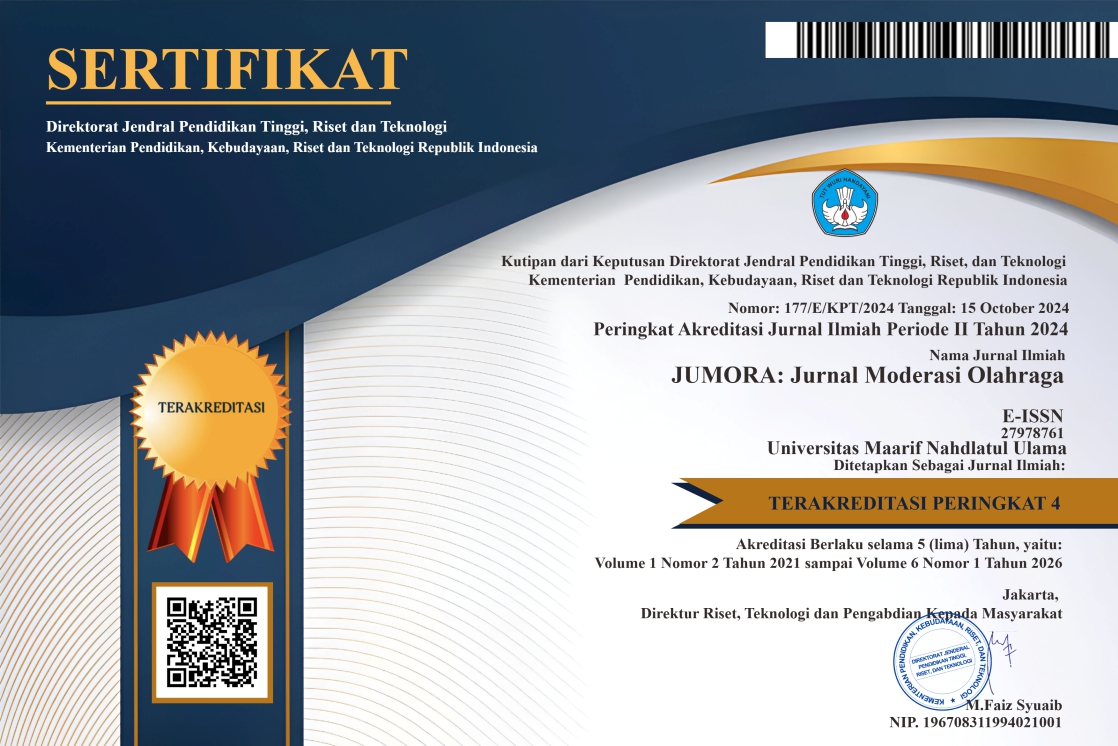Exploration of the Factors Influencing Children's Motivation to Participate in Futsal
DOI:
https://doi.org/10.53863/mor.v5i2.1818Keywords:
Children’s motivation, futsal, intrinsic enjoyment, parental support, coaching styleAbstract
This study explores the multidimensional factors that influence children’s motivation to participate in futsal, a rapidly growing sport among youth due to its accessibility and dynamic nature. Utilizing a qualitative research approach, data were collected through in-depth interviews and observations involving twelve children aged 9–12 years, supported by insights from their parents and coaches. The findings reveal that intrinsic enjoyment such as the sense of fun, freedom, and self expression is a primary motivator sustaining long-term engagement. Equally important, external factors like parental encouragement, coaching style, goal orientation, and the availability of structured institutional and environmental support also play critical roles. Children who feel emotionally supported, experience competence, and have access to inclusive futsal programs are more likely to remain motivated and committed to the sport. These results are discussed in light of Self-Determination Theory and ecological models of motivation, emphasizing the importance of fostering both internal satisfaction and external reinforcement. The study highlights the need for coaches, parents, and institutions to work collaboratively in creating environments that nurture children’s holistic development through sport. Understanding these motivational factors is essential for designing more effective, inclusive, and sustainable youth futsal programs
References
Albuquerque, L. R. de, Scheeren, E. M., Biscaia, R. R., Vagetti, G. C., & Oliveira, V. de. (2021). Positive development of young futsal players is influenced by the coach’s method and leadership profile. International Journal of Sports Science and Coaching, 16(3). https://doi.org/10.1177/1747954120979474
An, C. (2019). The content and role of intrinsic motivation in creative work: The importance of seeking “enjoyment.” Creativity Studies, 12(2). https://doi.org/10.3846/cs.2019.6451
Bukhari, & Dkk. (2019). Proses Pengajaran Biokimia Di SMA Berbasis Bahan Ajar Yang Terdapat Dalam Kehidupan Sehari-Hari. Dedikasi Pendidikan, 3(2).
Daniel, C., Halimi, F., & AlShammari, I. (2018). The Impact of Motivation and Parental Encouragement on English Language Learning: An Arab Students’ Perspective. Reading Matrix: An International Online Journal, 18(1).
Diaconu-Gherasim, L. R., & Măirean, C. (2016). Perception of parenting styles and academic achievement: The mediating role of goal orientations. Learning and Individual Differences, 49. https://doi.org/10.1016/j.lindif.2016.06.026
Faught, E., Vander Ploeg, K., Chu, Y. L., Storey, K., & Veugelers, P. J. (2016). The influence of parental encouragement and caring about healthy eating on children’s diet quality and body weights. Public Health Nutrition, 19(5). https://doi.org/10.1017/S1368980015002049
González-Víllora, S., Sierra-Díaz, M. J., Pastor-Vicedo, J. C., & Contreras-Jordán, O. R. (2019). The way to increase the motor and sport competence among children: The contextualized sport alphabetization model. Frontiers in Physiology, 10(MAY). https://doi.org/10.3389/fphys.2019.00569
Herrington, S., & Brussoni, M. (2015). Beyond Physical Activity: The Importance of Play and Nature-Based Play Spaces for Children’s Health and Development. In Current obesity reports (Vol. 4, Issue 4). https://doi.org/10.1007/s13679-015-0179-2
Jeelani, F., Fantham, G., & Bester, M. (2020). Exploring coaching style preference through conversations about coaching and personality. The Danish Journal of Coaching Psychology, 9(1).
Kim, A., Khon, N., & Aidosova, Z. (2016). Emotional Intelligence of a Coach as a Factor of Coach-Student Interaction. Procedia - Social and Behavioral Sciences, 236. https://doi.org/10.1016/j.sbspro.2016.12.026
Le Paven, M., Clayton, R., & Kermarrec, G. (2021). Learning to teach and play futsal using digital tablets: What knowledge do sports science students mobilize? Physical Culture and Sport, Studies and Research, 91(1). https://doi.org/10.2478/pcssr-2021-0017
Machado, A. A., Bezerra, I. S., Ponciano, K., Rica, R. L., Gama, E. F., Figueira, A., Gimenez, R., & Bocalini, D. S. (2018). Futsal as a strategy for the improvement of elementary abilities and for the development of the body image in children. Motricidade, 14(2–3). https://doi.org/10.6063/motricidade.12299
Mendes, D., Travassos, B., Carmo, J. M., Cardoso, F., Costa, I., & Sarmento, H. (2022). Talent Identification and Development in Male Futsal: A Systematic Review. In International Journal of Environmental Research and Public Health (Vol. 19, Issue 17). https://doi.org/10.3390/ijerph191710648
Navarro-Paton, R., Rodriguez-Fernandez, J. E., & Eirin-Nemia, R. (2016). Analysis of the satisfaction of those basic psychological needs, motivation and enjoyment in physical education in elementary school. Sportis: Revista Técnico-Científica Del Deporte Escolar, Educación Física y Psicomotricidad, 2(3).
Ricci, C. S., de Oliveira, F. V. C., & Marques, R. F. R. (2022). Sport within the extracurricular school context: meanings and contradictions related to futsal teaching. Educacao e Pesquisa, 48. https://doi.org/10.1590/S1678-4634202248237054eng
Rodriguez-Ayllon, M., Cadenas-Sánchez, C., Estévez-López, F., Muñoz, N. E., Mora-Gonzalez, J., Migueles, J. H., Molina-García, P., Henriksson, H., Mena-Molina, A., Martínez-Vizcaíno, V., Catena, A., Löf, M., Erickson, K. I., Lubans, D. R., Ortega, F. B., & Esteban-Cornejo, I. (2019). Role of Physical Activity and Sedentary Behavior in the Mental Health of Preschoolers, Children and Adolescents: A Systematic Review and Meta-Analysis. In Sports Medicine (Vol. 49, Issue 9). https://doi.org/10.1007/s40279-019-01099-5
Sanmiguel-Rodríguez, A., & Giráldez, V. A. (2021). Futsal in children and adolescents - a systematic review 2015-2020. Physical Activity Review, 9(2). https://doi.org/10.16926/par.2021.09.19
Spyrou, K., Freitas, T. T., Marín-Cascales, E., & Alcaraz, P. E. (2020). Physical and Physiological Match-Play Demands and Player Characteristics in Futsal: A Systematic Review. In Frontiers in Psychology (Vol. 11). https://doi.org/10.3389/fpsyg.2020.569897
Suman, & Ballhara, A. (2018). Relationship of parental encouragement with Self-Confidence of XII class students. Shikshan Anveshika, 8(1). https://doi.org/10.5958/2348-7534.2018.00008.9
Wang, C. (2022). The role of physical activity promoting thinking skills and emotional behavior of preschool children. Psicologia: Reflexao e Critica, 35(1). https://doi.org/10.1186/s41155-022-00223-1
Wang, Y., Liu, L., Ding, N., Li, H., & Wen, D. (2021). The Mediating Role of Stress Perception in Pathways Linking Achievement Goal Orientation and Depression in Chinese Medical Students. Frontiers in Psychology, 12. https://doi.org/10.3389/fpsyg.2021.614787
Weissman, D. L., & Elliot, A. J. (2023). Achievement Goal Perception: An Interpersonal Approach to Achievement Goals. Journal of Personality and Social Psychology, 125(3). https://doi.org/10.1037/pspp0000462
Downloads
Published
How to Cite
Issue
Section
License
Copyright (c) 2025 Agustin Krisna Putra, Ahmad Lani

This work is licensed under a Creative Commons Attribution-ShareAlike 4.0 International License.
Authors retain copyright and grant the journal right of first publication with the work simultaneously licensed under a Creative Commons Attribution-ShareAlike 4.0 International License that allows others to share the work with an acknowledgment of the work’s authorship and initial publication in this journal











